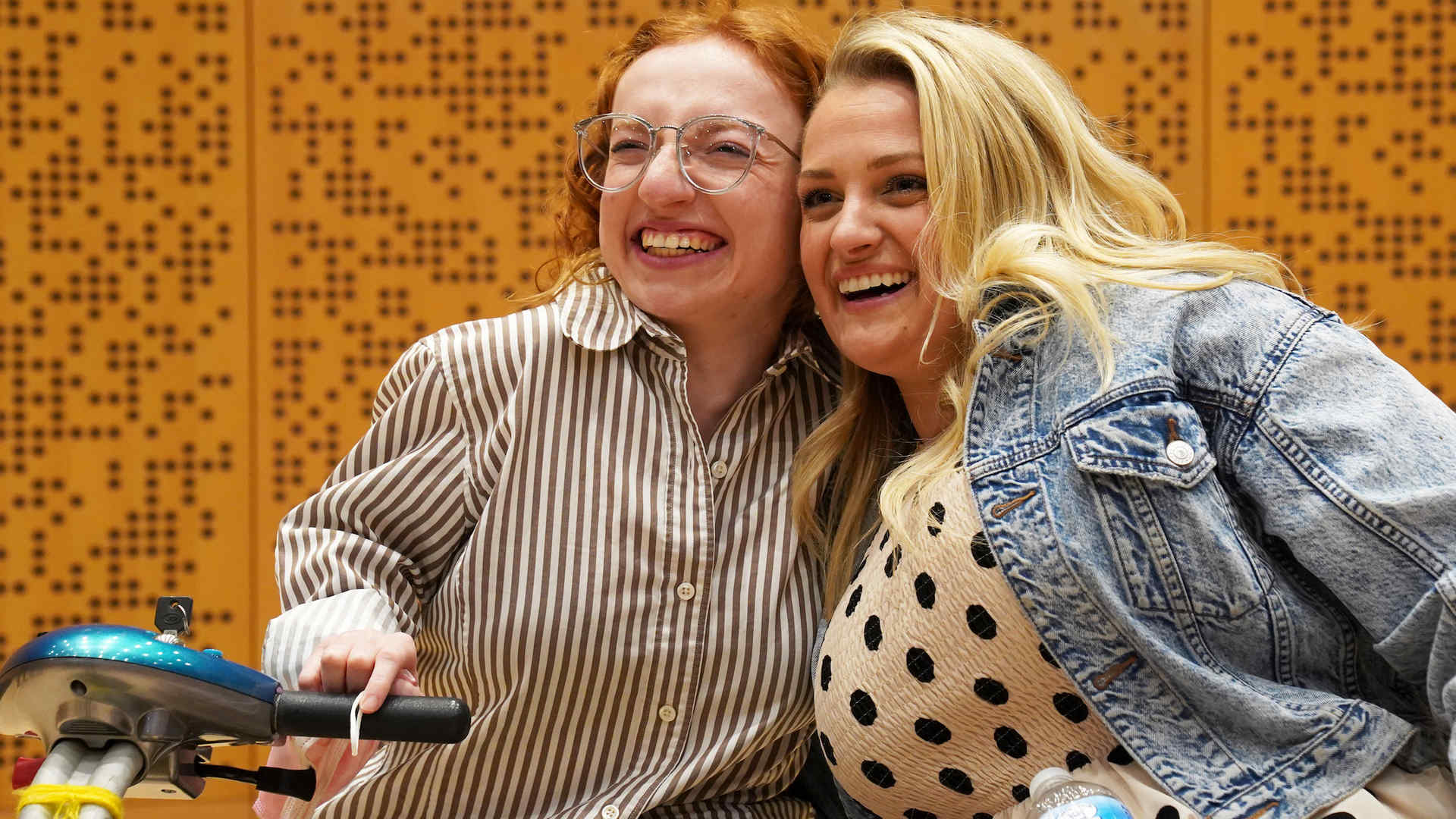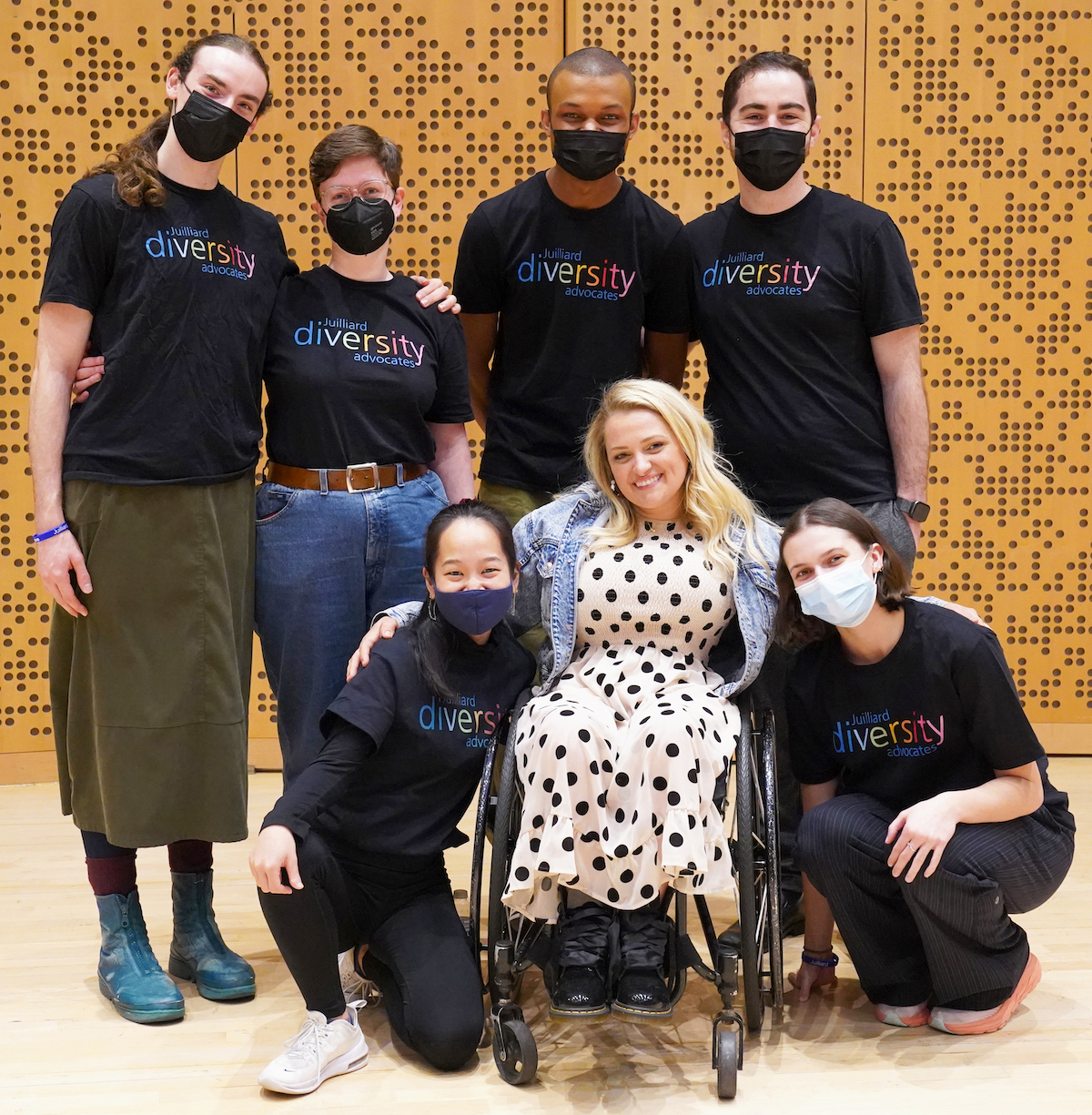
Ali Stroker at Juilliard
How can you act and dance when you’re in a wheelchair? This spring, the Juilliard Diversity Advocates, a panel of seven students, invited Ali Stroker to speak as part of their monthly Diversity Dialogue series. Three years ago, Stroker, now 34, became the first person in a wheelchair to win a Tony award, for her role as Ado Annie in Oklahoma!
Stroker talked to the 40 assembled students and staff members about “turning your limitations into opportunities” and her journey as an actor. Wheelchair-bound since she was 2 due to a car accident, she starred in a neighbor’s backyard production of Annie when she was 12. It was the first time she felt powerful—and the first time people stared at her because she was the star, not because she was different. As an undergrad acting student at NYU, she was continually fighting for her rights—to take dance class, to be cast in productions. “Being a first means you’re going to get pushback,” she said. “The challenge is to sit in the discomfort with everyone else.”
Stroker, of course, wound up thriving at NYU and afterward on stage, film, and TV. She’s also a fierce and tireless advocate. In thanking Stroker at the end of her speech, one of the Diversity Advocates said, “Our goal is to go out into the world as forever students and global citizens. Thank you for helping us do that.” —Susan Jackson
Seeing Yourself Represented
In her 2019 Tony acceptance speech, Ali Stroker said, “This award is for every kid who is watching tonight who has a disability, who has a limitation or a challenge, who has been waiting to see themselves represented in this arena—you are.” One of those kids was Ana Karneža, who would enroll at Juilliard the following fall.
By Ana Karneža
It’s 2018 and I have just finished watching the new revival of Oklahoma! at St. Ann’s Warehouse. This was the first time that I, a disabled actor, have seen another actor with a physical disability in a role bursting with life force and sexuality. Ali Stroker’s Tony-winning performance as Ado Annie infuses me with excitement about what is possible for disabled performers. It is a moment of relief, knowing that I’m not alone and that there are so many possibilities if I’m open to them.
A few years later, I am now a second-year MFA drama student, and I can’t wait to tell Ali how important that performance was for me. In fact, I even wrote about it in my Juilliard application essay. Before Ali did her talk about her artistic journey at the March Diversity Dialogue, we chatted about disability in the theater. Here is some of what she told me.

On theater
The theater played a defining role in Ali’s life. When she started acting, she found she was in command of the space, a stark contrast to real life, where she was stared at and felt she had no power. Through the years she discovered her identity through playing roles. Theater felt safe and empowering. “There’s something about having respect and recognition in this industry that allows me to be at peace. I’ll always feel different, but the industry is the place where I don’t. I feel in my purpose,” she said when I asked how her relationship with theater has evolved.
On being “the only one”
There are not enough disabled actors being welcomed into creative processes and acting opportunities, which means that if there is a disabled person working on a show, they are likely to be the only one. Ali’s initial approach to being in predominantly able-bodied spaces was “just surviving and figuring out a way of translating the abled-bodied world,” she said. Later she recognized her creative adaptive thinking was her superpower, a secret, magical thing that allows her to “unlock a creativity that no one else has.”
On navigating people’s comfort zones
Ali acknowledges that she has to code-switch all the time, translating her own experience into a more digestible, comfortable interaction with the able-bodied community. In recent years, she has pondered what all of this extra work means for her: “In trying to manage everyone, what then do I miss?” she said. “So now I sometimes allow people to figure something out on their own, or be uncomfortable for my benefit. Because I’ve spent years trying to manage everyone else’s benefit. The way for me now is just to be living and creating work all the time and through that you learn so much about yourself. I need the theater, working, acting, singing, writing. I need all of that to know myself.”
On setting boundaries and casting
Boundaries are essential. “The world will always use you as a reference point if you allow yourself to be, [but] I’m done trying to explain to people what’s true and what isn’t,” Ali said. “I don’t want a role because you want to check your diversity box.”
On writing disabled characters
As an actor who wants to be cast in a variety of roles that may not have anything to do with disability, I wondered about Ali’s thoughts on roles for disabled characters. Her take was clear. “Don’t write about disability if you don’t know about disability. Don’t allow the disability to be the conflict or the entire experience of the character unless you’re writing about someone who gets injured or falls sick—but I’m not interested in those stories. Then it feels educational, like a PSA.” In general, she considers the issue of representation mostly a casting issue, less of a writing issue. “Just cast disabled actors!”
On not scratching anyone’s curiosity itch
“I can feel in a show that people are stunned by it, because they’re allowed to stare and observe. The reality of the loss of ability is so frightening for so many people, and then they see it on stage,” she said. “My favorite thing is to do things that don’t bring this up, because I’m not going to scratch your curiosity itch,” she said. “We’re not talking about it, we’re dealing with it every day. Disability is the ultimate gift to art because there is a piece of truth that disability brings that is so vulnerable—or provocative—to an audience.”
Ana Karneža is a second-year drama student